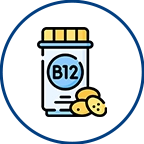Gestational Diabetes and Glucose Tolerance Testing During Pregnancy

Pregnancy is a transformative journey marked by various physiological changes, including fluctuations in blood sugar levels. While many women experience increased insulin resistance during pregnancy, some develop gestational diabetes, a condition that requires careful monitoring and management. In this comprehensive blog, we'll delve into the realm of gestational diabetes, explore the importance of glucose tolerance testing, and shed light on strategies for successful management.
Understanding Gestational Diabetes
Gestational Diabetes Mellitus is a form of diabetes that occurs exclusively during pregnancy. Because of the increased insulin resistance, it is characterized by elevated blood sugar levels. GDM poses risks to both the expectant mother and the developing fetus, making early detection and management crucial.
Home Sample Collection
Risk Factors
Certain factors increase the risk of developing gestational diabetes, including:
Age: Women over the age of 25 are at a higher risk.
Family History: The chance is higher if diabetes runs in the family.
Obesity: Being overweight or obese before pregnancy.
Ethnicity: There is an increased risk for several ethnic groups, including Asians, Hispanics, and African Americans.
Previous GDM: Women who had gestational diabetes in a previous pregnancy.
Polycystic Ovary Syndrome (PCOS): Its a disorder that impacts insulin resistance and hormone levels.
The Role of Glucose Tolerance Testing
Glucose tolerance test (GTT) is a diagnostic tool used to identify gestational diabetes. The test involves monitoring how the body processes glucose (sugar) after consuming a sugary drink. It helps healthcare providers assess how well a pregnant woman's body is regulating blood sugar levels.
Types of GTT
One-Hour Glucose Challenge Test: A preliminary screening test where a woman drinks a sugary solution, and her blood sugar level is tested after an hour. If the result is elevated, further testing is recommended.
Three-Hour Glucose Tolerance Test: Conducted if the one-hour test is abnormal. The woman fasts overnight, drinks a more concentrated sugary solution, and blood sugar levels are tested at intervals over three hours.
Managing Gestational Diabetes
Effective management of gestational diabetes is crucial to ensure the health of both the mother and the baby. It involves a combination of lifestyle changes, monitoring blood sugar levels, and, in some cases, medication.
Lifestyle Modifications
Healthy Diet: Blood sugar may be managed with a balanced diet full of fruits, vegetables, lean meats, and whole grains.
Regular Exercise: Engaging in safe and moderate physical activity under medical supervision improves insulin sensitivity.
Blood Sugar Monitoring: Regularly checking blood sugar levels helps track progress and make necessary adjustments.
Medical Interventions
Insulin Therapy: If blood sugar levels remain elevated despite lifestyle changes, insulin therapy might be prescribed.
Frequent Check-Ups: Regular prenatal check-ups help monitor the health of both the mother and the baby.
Ultrasound Monitoring: Fetal growth and development are closely monitored through ultrasound.
The Importance of Gestational Diabetes Management
When properly controlled, gestational diabetes lowers the chance of difficulties for both the mother and the unborn child and enables women to have safe pregnancies. Uncontrolled gestational diabetes can lead to increased birth weight, preterm birth, and even type 2 diabetes later in life.
Conclusion
Gestational diabetes and glucose tolerance testing during pregnancy play pivotal roles in ensuring the well-being of both expectant mothers and their babies. By understanding the risks, diagnosis, and management strategies associated with gestational diabetes, women can make informed decisions and work collaboratively with healthcare providers to ensure a healthy pregnancy journey.
Remember, every pregnancy is unique, and it's essential to work closely with healthcare professionals to tailor management strategies according to individual needs. By prioritizing proper care and following medical guidance, expectant mothers can mitigate the impact of gestational diabetes and embrace the joyous experience of pregnancy with confidence.
Frequently Asked Questions
What is gestational diabetes, and how does it differ from other types of diabetes?
Gestational diabetes is a type of diabetes that occurs during pregnancy. Unlike other types of diabetes, it develops specifically during pregnancy and usually resolves after childbirth. It is characterized by elevated blood sugar levels resulting from increased insulin resistance.
What are the risks associated with gestational diabetes for both the mother and the baby?
For the mother, gestational diabetes increases the risk of high blood pressure, preeclampsia, and the likelihood of developing type 2 diabetes later in life. For the baby, risks include macrosomia (large birth weight), preterm birth, low blood sugar after birth, and a higher chance of developing obesity and type 2 diabetes later in life.
How is gestational diabetes diagnosed?
Gestational diabetes is diagnosed through glucose tolerance testing (GTT). A one-hour glucose challenge test is usually performed first. If the result is elevated, a three-hour glucose tolerance test is conducted to confirm the diagnosis.
What is involved in glucose tolerance testing (GTT)?
GTT involves drinking a sugary solution and having blood sugar levels tested at specific intervals. For the one-hour test, blood is drawn an hour after drinking the solution. If needed, a three-hour test is performed, involving fasting overnight and blood draws at different time points.
Can gestational diabetes be managed without medication?
It is often possible to treat gestational diabetes with just a change in lifestyle. A balanced diet, regular exercise, and blood sugar monitoring are essential components of managing the condition. However, if blood sugar levels remain elevated, insulin therapy might be necessary.
How does glucose monitoring work for women with gestational diabetes?
Women who have gestational diabetes should routinely check their blood sugar levels. This involves using a glucose meter to check blood sugar levels before and after meals. Healthcare providers guide patients on target ranges and frequency of monitoring.
Does gestational diabetes increase the chances of having diabetes after pregnancy?
Yes, having gestational diabetes increases the risk of developing type 2 diabetes later in life. It's important for women who have had gestational diabetes to undergo regular diabetes screening after pregnancy and to adopt a healthy lifestyle to reduce the risk.
Book Your Slot
Our Locations Near You in Hyderabad
3KM from Banjara Hills
1.9KM from Yusufguda
3KM from Madhura Nagar
5KM from Shaikpet
Profiles
- Cardiac Risk Profile
- Pituitary marker Profile
- Rheumatoid Arthritis Profile
- Dengue Fever Panel
- Lung Cancer Panel 1 Complete Molecular
- Gastroenteritis Screening Panel
- Thyroid Profile (T3,T4,TSH), Serum
- Pancreatic Marker Profile
- STD profile
- Androgen Profile
- Lipid Profile, Serum
- Pancreatic(acute)Profile
- PCOD Profile
Radiology
Pathology Tests
- Glucose Fasting (FBS),Sodium Fluoride Plasma
- Creatinine, Serum
- Glycosylated Hemoglobin (HbA1C)
- Vitamin B12 (Cyanocobalamin), Serum
- Thyroid Stimulating Hormone (TSH) Ultrasensitive, Serum
- Complete Urine Examination (CUE), Urine
- Liver Function Test (LFT),Serum
- Dengue (IgG & IgM), Serum
- Dengue Antigen (Ns1) Rapid, Serum
- C-Reactive Protein (CRP), Serum
- Widal (Slide Method), Serum
- Total IgE, Serum




